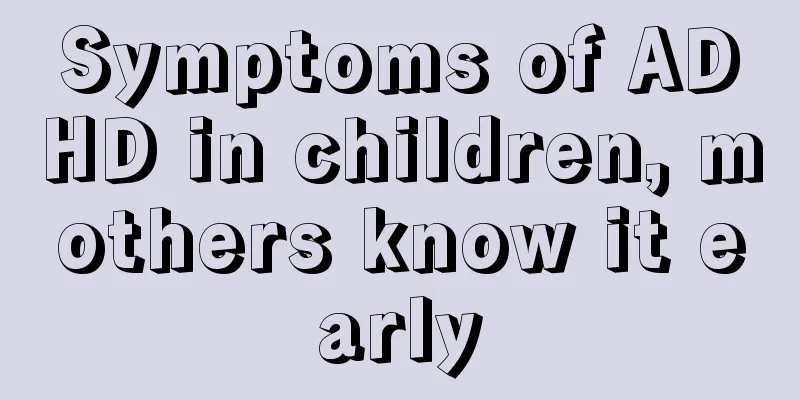What should I do if my one-year-old baby always has poor digestion?

|
Babies get sick very frequently during their growth process, which is also a manifestation of imperfect functional development, especially poor digestion, which is something babies have to experience during their growth process. When a baby has poor digestion, it must be taken seriously, especially with active conditioning and care. What should I do if my one-year-old baby always has poor digestion? Let’s take a look. The following things should be done when babies have diarrhea: (1) Never fast. Regardless of the cause of diarrhea, although the baby's digestive tract function is reduced, the baby can still digest and absorb some nutrients, so breastfed babies should continue to be fed as long as the baby wants to eat. For babies who drink milk, the amount of milk they drink can be reduced by about 1/3 each time, and a little water can be added to the milk. If the baby is not eating enough after reducing the amount, you can add salty rice soup, or feed carrot water or fresh vegetable water to supplement inorganic salts and vitamins. For babies who are already eating complementary foods such as porridge, the amount of these foods can be slightly reduced. It depends on the baby's thirst. (2) Ensure water supply. Detect dehydration early. When an infant has severe diarrhea, accompanied by vomiting, fever, thirst, dry lips, little or no urine, sunken eye sockets and anterior fontanelle, the infant becomes "thin" in a short period of time, the skin becomes "wilted", and the infant cries without tears, this indicates that dehydration has occurred and the sick child should be sent to the hospital for treatment in time. (3) Prevent dehydration. Dehydration will not occur by continuously replenishing the water and salt lost due to diarrhea and vomiting with oral rehydration salts. Oral rehydration salt (ORS) 1000 ml contains 3.5 grams of sodium chloride, 2.5 grams of sodium bicarbonate, 1.5 grams of potassium chloride, and 20 grams of glucose. The dosage should be followed according to the doctor's advice, but the amount and drinking speed for preventing dehydration and treating dehydration are different. Oral rehydration salts contain a sugar concentration of 2%. Studies have shown that this sugar concentration is most conducive to mediating salt and water into the body to replenish losses caused by diarrhea. Its effectiveness has been recognized worldwide and it is a good medicine for preventing and treating diarrhea and dehydration. (4) Do not abuse antibiotics. Many mild diarrhea cases can heal themselves without the need for antibiotics or other anti-inflammatory drugs; or taking microecological preparations such as Mommy Love, or water-absorbing drugs such as Smecta can quickly cure the disease. Especially for autumn diarrhea caused by viral infection, the use of antibiotics is not only ineffective but harmful. Antibiotics can be used for bacterial dysentery or other bacterial diarrhea, but treatment must be under the guidance of a doctor. (5) Provide good home care. Parents should carefully observe the nature, color, frequency and amount of stool, and keep abnormal stool as specimens for testing to find the cause of diarrhea; pay attention to keeping the abdomen warm to reduce intestinal peristalsis, and wrap the abdomen with a towel or apply a hot water bottle to the abdomen; make sure the baby gets more rest, wash the buttocks with warm water after defecation to prevent diaper rash; diapers should be cleaned, boiled and disinfected, and dried before use. Through the above introduction, we now know what to do if a baby over one year old always has poor digestion. This is a situation that occurs during infancy. When the baby has this problem, we must not only pay attention to conditioning, but also prevent serious situations from occurring, especially preventing the child from having a fever or dehydration, and replenishing water in time. |
<<: What should I do if my baby has diarrhea due to poor digestion?
>>: What tests are needed for children with ADHD?
Recommend
What diseases should be distinguished from the developmental stunting of little girls?
The most common characteristics of poor developme...
What is the reason for the child's persistent high fever? The inflammation in the body needs to be eliminated
A mother's biggest fear is that her child wil...
If your child’s face turns yellow, this is how you should treat it!
Some children are pink and tender when they are y...
Four major contradictions hidden in intergenerational education
As an objective form of family education, grandpa...
White scalp on baby's head
Some white dandruff will appear on the baby's...
What are the specific symptoms of ADHD in children?
Many parents find that their children cannot sit ...
What's going on with white spots on my baby's neck?
Some parents observe their children more carefull...
What should I do if my baby burps after eating?
Everyone may have hiccups after eating. This is a...
Causes of black teeth in children
In life, many children often encounter the proble...
What should I do if my child's bone age is too high?
In modern society, due to many reasons, some chil...
How harmful is CT to children?
CT scan is a relatively accurate way to diagnose ...
Why do newborn babies have purple lips?
What's going on with newborn babies' purp...
What foods can supplement children's poor memory?
With the development of economic life, more scien...
Measurement and reference standards for height and weight of seven-month-old babies
Babies are the most beautiful and precious gifts ...
What medicine is good for children with frequent urination
Not only adults experience frequent urination, bu...









